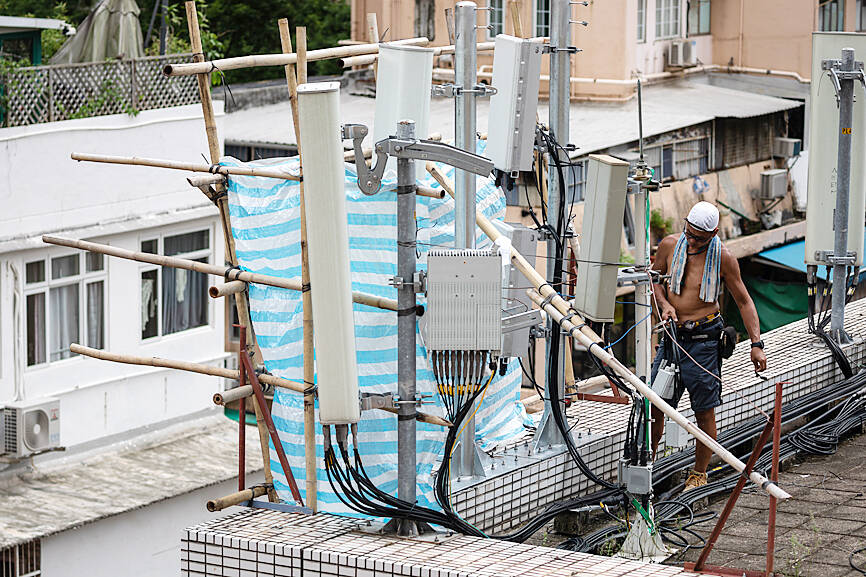Electromagnetic emissions from 4G and 5G base stations pose only minimal health risks, as they are far below the standards stipulated by the Environmental Protection Administration (EPA) and the International Commission on Non-Ionizing Radiation Protection (ICNIRP), the National Communications Commission (NCC) said yesterday.
Since the auction of 5G licenses two years ago, more than 35,000 5G base stations have been built across the nation, covering 94 percent of the population, NCC Commissioner Wang Cheng-chia (王正嘉) told a news conference.
However, some people are still worried about potential health risks, Wang said.

Photo: EPA-EFE
Some base stations had been removed after protests by local residents, only to be reinstalled after the residents realized they could not receive phone signals, Wang said.
To allay public concern, the NCC tasked National Yunlin University of Science and Technology with conducting a study of electromagnetic emissions by 4G and 5G base stations, he said.
The study involved 34 sites in the north, south and east of Taiwan, as well as the outlying islands, that had 4G and 5G installations, said Kuo Wen-chung (郭文中), a professor of computer science and information engineering at the university.
“The sites were chosen because they accommodate devices and antennas installed by a majority of telecoms, and the results we obtained from the sites would best represent all base stations,” he said.
Researchers measured non-ionizing electromagnetic radiation (NIEA) based on the rules stipulated by the EPA, Kuo said.
“We found that the highest NIEA value detected was only about 0.039 percent of the reference values stipulated by the ICNIRP and the EPA, which are close to those of European countries and the US. The average of the highest values detected was 0.0125 percent of the reference values,” Kuo said.
The results show that a base station is even safer than a microwave oven and an electric razor, he said.
The commission said that 50,000 microcell stations are to be installed on utility poles and traffic lights to further boost 5G coverage.
Although the NCC has been running an awareness campaign for more than 10 years, it has not been particularly successful in assuaging public fears. Aside from public protests, the commission has only managed to secure 685 government properties on which to install base stations from 2014 to last year.

The Ministry of Economic Affairs has fined Taobao NT$1.2 million (US$36,912) for advertisements that exceed its approved business scope, requiring the Chinese e-commerce platform to make corrections in the first half of this year or its license may be revoked. Lawmakers have called for stricter enforcement of Chinese e-commerce platforms and measures to prevent China from laundering its goods through Taiwan in response to US President Donald Trump’s heavy tariffs on China. The Legislative Yuan’s Finance Committee met today to discuss policies to prevent China from dumping goods in Taiwan, inviting government agencies to report. Democratic Progressive Party Legislator Kuo Kuo-wen (郭國文) said

The Ministry of Economic Affairs has fined Taobao NT$1.2 million (US$36,900) for advertisements that exceeded its approved business scope and ordered the Chinese e-commerce platform to make corrections in the first half of this year or its license would be revoked. Lawmakers have called for stricter supervision of Chinese e-commerce platforms and more stringent measures to prevent China from laundering its goods through Taiwan as US President Donald Trump’s administration cracks down on origin laundering. The legislature’s Finance Committee yesterday met to discuss policies to prevent China from dumping goods in Taiwan, inviting government agencies to report on the matter. Democratic Progressive Party

Taiwan and its Pacific ally Tuvalu on Tuesday signed two accords aimed at facilitating bilateral cooperation on labor affairs, according to Taiwan’s Ministry of Foreign Affairs (MOFA). The governments inked two agreements in Taipei, witnessed by Foreign Minister Lin Chia-lung (林佳龍) and visiting Deputy Tuvaluan Prime Minister Panapasi Nelesone, MOFA said in a news release. According to MOFA, the agreements will facilitate cooperation on labor issues and allow the two sides to mutually recognize seafarers’ certificates and related training. Taiwan would also continue to collaborate with Tuvalu across various fields to promote economic prosperity as well as the well-being of their

Sung Chien-liang (宋建樑), who led efforts to recall Democratic Progressive Party (DPP) Legislator Lee Kun-cheng (李坤城), was released on bail of NT$80,000 today amid outcry over his decision to wear a Nazi armband to questioning the night before. Sung arrived at the New Taipei District Prosecutors’ Office for questioning in a recall petition forgery case last night wearing a red armband bearing a swastika, carrying a copy of Adolf Hitler’s Mein Kampf and giving a Nazi salute. Sung left the building at 1:15am without the armband and covering the book with his coat. Lee said today that this is a serious